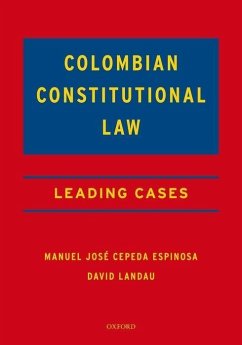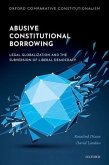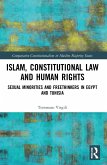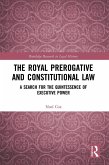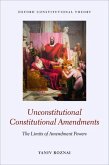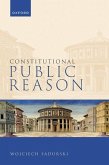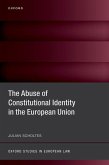- Gebundenes Buch
- Merkliste
- Auf die Merkliste
- Bewerten Bewerten
- Teilen
- Produkt teilen
- Produkterinnerung
- Produkterinnerung
This book provides in English the case law of the Colombian Constitutional Court, which has become one of the most creative and important courts of the global south and the world since its creation in 1991. It offers concise and carefully chosen extracts of the Court's most important cases, along with notes and introductory materials to place them in historical context. The materials focus on the Court's contributions in a comparative perspective, showing how theyare exemplary of a range of problems faced by courts around the world and particularly as an example of aggressive judicial review by the courts of the global south.…mehr
Andere Kunden interessierten sich auch für
![Abusive Constitutional Borrowing Abusive Constitutional Borrowing]() Rosalind Dixon (Professor of Law, Professor of Law, University of NAbusive Constitutional Borrowing122,99 €
Rosalind Dixon (Professor of Law, Professor of Law, University of NAbusive Constitutional Borrowing122,99 €![Islam, Constitutional Law and Human Rights Islam, Constitutional Law and Human Rights]() Tommaso VirgiliIslam, Constitutional Law and Human Rights49,99 €
Tommaso VirgiliIslam, Constitutional Law and Human Rights49,99 €![The Royal Prerogative and Constitutional Law The Royal Prerogative and Constitutional Law]() Noel CoxThe Royal Prerogative and Constitutional Law38,99 €
Noel CoxThe Royal Prerogative and Constitutional Law38,99 €![Unconstitutional Constitutional Amendments Unconstitutional Constitutional Amendments]() Yaniv Roznai (Assistant Professor, Radzyner School of Law, InterdisUnconstitutional Constitutional Amendments128,99 €
Yaniv Roznai (Assistant Professor, Radzyner School of Law, InterdisUnconstitutional Constitutional Amendments128,99 €![Constitutional Public Reason Constitutional Public Reason]() Wojciech Sadurski (Challis Chair in Challis Chair in JurisprudenceConstitutional Public Reason144,99 €
Wojciech Sadurski (Challis Chair in Challis Chair in JurisprudenceConstitutional Public Reason144,99 €![The Abuse of Constitutional Identity in the European Union The Abuse of Constitutional Identity in the European Union]() Julian Scholtes (Lecturer in Public Law, Lecturer in Public Law, UnThe Abuse of Constitutional Identity in the European Union127,99 €
Julian Scholtes (Lecturer in Public Law, Lecturer in Public Law, UnThe Abuse of Constitutional Identity in the European Union127,99 €![The Brussels Effect The Brussels Effect]() Anu Bradford (Henry L. Moses Professor of Law and International OrgThe Brussels Effect45,99 €
Anu Bradford (Henry L. Moses Professor of Law and International OrgThe Brussels Effect45,99 €-
-
-
This book provides in English the case law of the Colombian Constitutional Court, which has become one of the most creative and important courts of the global south and the world since its creation in 1991. It offers concise and carefully chosen extracts of the Court's most important cases, along with notes and introductory materials to place them in historical context. The materials focus on the Court's contributions in a comparative perspective, showing how theyare exemplary of a range of problems faced by courts around the world and particularly as an example of aggressive judicial review by the courts of the global south.
Produktdetails
- Produktdetails
- Verlag: Oxford University Press Inc
- Seitenzahl: 448
- Erscheinungstermin: 27. März 2017
- Englisch
- Abmessung: 257mm x 178mm x 28mm
- Gewicht: 958g
- ISBN-13: 9780190640361
- ISBN-10: 0190640367
- Artikelnr.: 47863311
- Verlag: Oxford University Press Inc
- Seitenzahl: 448
- Erscheinungstermin: 27. März 2017
- Englisch
- Abmessung: 257mm x 178mm x 28mm
- Gewicht: 958g
- ISBN-13: 9780190640361
- ISBN-10: 0190640367
- Artikelnr.: 47863311
Manuel José Cepeda Espinosa is the President of the International Association of Constitutional Law (2014-2018) and was President and Justice of the Colombian Constitutional Court (February 2001-January 2009). He played an important role in the making of the 1991 Constitution as Presidential Advisor for the Constituent Assembly and Constitutional Drafting for President of the Republic César Gaviria Trujillo (1990-1991), and Presidential Advisor for legal affairs for the President of the Republic Virgilio Barco Vargas (1987-1990). He has written extensively on Colombian constitutional law and the impact of the 1991 Constitution. Before being elected to the Court, he taught constitutional law and was Dean of the Law School, at Universidad de los Andes (1996-2000), from where he holds a law degree. He holds an LLM from Harvard Law School. He has served as a consultant on several matters, most recently in the design of transitional justice institutions during the peace process in Colombia. David Landau holds an A.B, J.D., and Ph.D in political science from Harvard University. He writes primarily about the field of comparative constitutional law, with a concentration on Latin America. His recent work focused on democratic transitions and the potential risks of constitutional amendment and constitution-making for democracy, as well as on judicial activism on socio-economic rights issues across the developing world. He has published in various journals including the Harvard International Law Journal and the International Journal of Constitutional Law. In 2011, Professor Landau served as a consultant on constitutional issues for the Truth and Reconciliation Commission of Honduras. Since 2012, he has been a founding editor of IConnect, the blog of the International Journal of Constitutional Law.
* Table of Contents
* Preface
* Chapter 1: Introduction to the Colombian Constitution of 1991 and the
Constitutional Court
* A. The Prelude to the 1991 Constitution: Institutional Decay and a
Crisis of Public Order
* B. The Making of the 1991 Constitution
* C. The Structure and Powers of the Colombian Constitutional Court
* D. The Constitutional Court's Decision-making Process and
Interpretive Style
* E. The Constitutional Court in the Post-1991 Political Context
* F. Methodology and Plan of this Volume
* Part I: The Constitutional Court
* Chapter 2: The Role of the Constitutional Court
* A. The Role Conception of the Constitutional Court
* B. Precedent and the Effects of Constitutional Court Decisions
* 1. The Power of the Constitutional Court to Determine the Effects of
its Own Decisions
* 2. The Construction of a System of Precedent
* C. The Constitutional Block: Incorporation of International Law
* Part II: Rights
* Chapter 3: Dignity and Autonomy
* A. Decriminalization of Narcotics for Personal Use
* B. Euthanasia and Dignified Death
* C. Personal appearance
* D. Intersex Rights
* E. Abortion
* Chapter 4: Equality
* A. The Equality and Dignity Rights of Same-Sex Couples
* B. Equality, Affirmative Action, and Gender Quotas
* C. Discrimination Against the Disabled and the Positive Dimension of
Equality
* Chapter 5: Freedom of Speech and Freedom of Religion
* A. Limitations on Speech for Security and Decency
* B. Limitations on Speech for Privacy and Reputation
* C. The Freedom of Expression and Political Campaigns
* 1. Financing Political Parties and Campaigns
* 2. Access to Televised Debates
* D. Religious Establishment
* E. The Accommodation of Religion and Conscientious Objection
* Chapter 6: Social Rights
* A. Foundations of Justiciability: The Right to a Minimum Level of
Subsistence
* B. The Court and Economic Crisis
* 1. The Housing Finance Crisis
* 2. The Budgetary Crisis and Public Sector Salaries
* C. The Right to Health: From Individual to Structural Remedies
* 1. Individualized enforcement
* 2. Structural Enforcement
* D. A Structural Remedy for Internal Forced Displacement
* E. Informal and Marginalized Work
* 1. Street vendors
* 2. Informal recyclers
* 3. Sex Workers
* F. The Right to Water
* Chapter 7: The Rights of Victims and Transitional Justice
* A. The Rights of Victims During Criminal Processes
* B. The Rights of Victims During Internal Armed Conflict
* C. The Peace Process with Guerrilla Groups
* Chapter 8: The Rights of Indigenous Peoples
* A. Conflicts between the Rights of Indigenous Communities and their
Members
* 1. Non-Traditional Criminal Punishment
* 2. Religious Conflict and Diversity
* 3. Cultural Practices and the Rights of Children
* B. Diversity and Political Representation
* C. The Right to Prior Consultation
* 1. Consultation on Projects Exploiting Natural Resources
* 2. Consultation on Government Programs
* 3. Consultation on Congressional Laws
* Part III: The Separation of Powers
* Chapter 9: The President: Problems of Executive Overreach
* A. Limiting Executive Discretion
* B. The Separation of Powers and National Security
* C. States of Exception
* 1. Review of the Declaration of State of Internal Commotion
* 2. Review of Decrees issued during a State of Internal Commotion
* Chapter 10: The Congress: Problems of Abdication and Deliberation
* A. The Scope of Parliamentary Inviolability
* B. Legislative Delegation to the Executive
* C. Legislative Deliberation and Procedure
* Part IV: Constitutional Change
* Chapter 11: Constitutional Amendment and the Substitution of the
Constitution Doctrine
* A. Procedural Review of Constitutional Amendments
* B. Control of Constitutional Reform via Referendum
* C. The Substitution of the Constitution Doctrine
* 1. The First Reelection Decision
* 2. The Second Reelection Decision
* 3. The Fiscal Sustainability Amendment
* Appendix 1: The Orders of the Constitutional Court
* 1. The Conditional Decision
* 2. The Deferred Decision
* 3. The Integrative Decision
* B. The Tutela
* 1. Structural Orders
* 2. Inter comunis or inter pares effects
* 3. The State of Unconstitutional Affairs Doctrine
* Appendix 2: The Constitution of Colombia (1991) (selected provisions)
* Index
* Preface
* Chapter 1: Introduction to the Colombian Constitution of 1991 and the
Constitutional Court
* A. The Prelude to the 1991 Constitution: Institutional Decay and a
Crisis of Public Order
* B. The Making of the 1991 Constitution
* C. The Structure and Powers of the Colombian Constitutional Court
* D. The Constitutional Court's Decision-making Process and
Interpretive Style
* E. The Constitutional Court in the Post-1991 Political Context
* F. Methodology and Plan of this Volume
* Part I: The Constitutional Court
* Chapter 2: The Role of the Constitutional Court
* A. The Role Conception of the Constitutional Court
* B. Precedent and the Effects of Constitutional Court Decisions
* 1. The Power of the Constitutional Court to Determine the Effects of
its Own Decisions
* 2. The Construction of a System of Precedent
* C. The Constitutional Block: Incorporation of International Law
* Part II: Rights
* Chapter 3: Dignity and Autonomy
* A. Decriminalization of Narcotics for Personal Use
* B. Euthanasia and Dignified Death
* C. Personal appearance
* D. Intersex Rights
* E. Abortion
* Chapter 4: Equality
* A. The Equality and Dignity Rights of Same-Sex Couples
* B. Equality, Affirmative Action, and Gender Quotas
* C. Discrimination Against the Disabled and the Positive Dimension of
Equality
* Chapter 5: Freedom of Speech and Freedom of Religion
* A. Limitations on Speech for Security and Decency
* B. Limitations on Speech for Privacy and Reputation
* C. The Freedom of Expression and Political Campaigns
* 1. Financing Political Parties and Campaigns
* 2. Access to Televised Debates
* D. Religious Establishment
* E. The Accommodation of Religion and Conscientious Objection
* Chapter 6: Social Rights
* A. Foundations of Justiciability: The Right to a Minimum Level of
Subsistence
* B. The Court and Economic Crisis
* 1. The Housing Finance Crisis
* 2. The Budgetary Crisis and Public Sector Salaries
* C. The Right to Health: From Individual to Structural Remedies
* 1. Individualized enforcement
* 2. Structural Enforcement
* D. A Structural Remedy for Internal Forced Displacement
* E. Informal and Marginalized Work
* 1. Street vendors
* 2. Informal recyclers
* 3. Sex Workers
* F. The Right to Water
* Chapter 7: The Rights of Victims and Transitional Justice
* A. The Rights of Victims During Criminal Processes
* B. The Rights of Victims During Internal Armed Conflict
* C. The Peace Process with Guerrilla Groups
* Chapter 8: The Rights of Indigenous Peoples
* A. Conflicts between the Rights of Indigenous Communities and their
Members
* 1. Non-Traditional Criminal Punishment
* 2. Religious Conflict and Diversity
* 3. Cultural Practices and the Rights of Children
* B. Diversity and Political Representation
* C. The Right to Prior Consultation
* 1. Consultation on Projects Exploiting Natural Resources
* 2. Consultation on Government Programs
* 3. Consultation on Congressional Laws
* Part III: The Separation of Powers
* Chapter 9: The President: Problems of Executive Overreach
* A. Limiting Executive Discretion
* B. The Separation of Powers and National Security
* C. States of Exception
* 1. Review of the Declaration of State of Internal Commotion
* 2. Review of Decrees issued during a State of Internal Commotion
* Chapter 10: The Congress: Problems of Abdication and Deliberation
* A. The Scope of Parliamentary Inviolability
* B. Legislative Delegation to the Executive
* C. Legislative Deliberation and Procedure
* Part IV: Constitutional Change
* Chapter 11: Constitutional Amendment and the Substitution of the
Constitution Doctrine
* A. Procedural Review of Constitutional Amendments
* B. Control of Constitutional Reform via Referendum
* C. The Substitution of the Constitution Doctrine
* 1. The First Reelection Decision
* 2. The Second Reelection Decision
* 3. The Fiscal Sustainability Amendment
* Appendix 1: The Orders of the Constitutional Court
* 1. The Conditional Decision
* 2. The Deferred Decision
* 3. The Integrative Decision
* B. The Tutela
* 1. Structural Orders
* 2. Inter comunis or inter pares effects
* 3. The State of Unconstitutional Affairs Doctrine
* Appendix 2: The Constitution of Colombia (1991) (selected provisions)
* Index
* Table of Contents
* Preface
* Chapter 1: Introduction to the Colombian Constitution of 1991 and the
Constitutional Court
* A. The Prelude to the 1991 Constitution: Institutional Decay and a
Crisis of Public Order
* B. The Making of the 1991 Constitution
* C. The Structure and Powers of the Colombian Constitutional Court
* D. The Constitutional Court's Decision-making Process and
Interpretive Style
* E. The Constitutional Court in the Post-1991 Political Context
* F. Methodology and Plan of this Volume
* Part I: The Constitutional Court
* Chapter 2: The Role of the Constitutional Court
* A. The Role Conception of the Constitutional Court
* B. Precedent and the Effects of Constitutional Court Decisions
* 1. The Power of the Constitutional Court to Determine the Effects of
its Own Decisions
* 2. The Construction of a System of Precedent
* C. The Constitutional Block: Incorporation of International Law
* Part II: Rights
* Chapter 3: Dignity and Autonomy
* A. Decriminalization of Narcotics for Personal Use
* B. Euthanasia and Dignified Death
* C. Personal appearance
* D. Intersex Rights
* E. Abortion
* Chapter 4: Equality
* A. The Equality and Dignity Rights of Same-Sex Couples
* B. Equality, Affirmative Action, and Gender Quotas
* C. Discrimination Against the Disabled and the Positive Dimension of
Equality
* Chapter 5: Freedom of Speech and Freedom of Religion
* A. Limitations on Speech for Security and Decency
* B. Limitations on Speech for Privacy and Reputation
* C. The Freedom of Expression and Political Campaigns
* 1. Financing Political Parties and Campaigns
* 2. Access to Televised Debates
* D. Religious Establishment
* E. The Accommodation of Religion and Conscientious Objection
* Chapter 6: Social Rights
* A. Foundations of Justiciability: The Right to a Minimum Level of
Subsistence
* B. The Court and Economic Crisis
* 1. The Housing Finance Crisis
* 2. The Budgetary Crisis and Public Sector Salaries
* C. The Right to Health: From Individual to Structural Remedies
* 1. Individualized enforcement
* 2. Structural Enforcement
* D. A Structural Remedy for Internal Forced Displacement
* E. Informal and Marginalized Work
* 1. Street vendors
* 2. Informal recyclers
* 3. Sex Workers
* F. The Right to Water
* Chapter 7: The Rights of Victims and Transitional Justice
* A. The Rights of Victims During Criminal Processes
* B. The Rights of Victims During Internal Armed Conflict
* C. The Peace Process with Guerrilla Groups
* Chapter 8: The Rights of Indigenous Peoples
* A. Conflicts between the Rights of Indigenous Communities and their
Members
* 1. Non-Traditional Criminal Punishment
* 2. Religious Conflict and Diversity
* 3. Cultural Practices and the Rights of Children
* B. Diversity and Political Representation
* C. The Right to Prior Consultation
* 1. Consultation on Projects Exploiting Natural Resources
* 2. Consultation on Government Programs
* 3. Consultation on Congressional Laws
* Part III: The Separation of Powers
* Chapter 9: The President: Problems of Executive Overreach
* A. Limiting Executive Discretion
* B. The Separation of Powers and National Security
* C. States of Exception
* 1. Review of the Declaration of State of Internal Commotion
* 2. Review of Decrees issued during a State of Internal Commotion
* Chapter 10: The Congress: Problems of Abdication and Deliberation
* A. The Scope of Parliamentary Inviolability
* B. Legislative Delegation to the Executive
* C. Legislative Deliberation and Procedure
* Part IV: Constitutional Change
* Chapter 11: Constitutional Amendment and the Substitution of the
Constitution Doctrine
* A. Procedural Review of Constitutional Amendments
* B. Control of Constitutional Reform via Referendum
* C. The Substitution of the Constitution Doctrine
* 1. The First Reelection Decision
* 2. The Second Reelection Decision
* 3. The Fiscal Sustainability Amendment
* Appendix 1: The Orders of the Constitutional Court
* 1. The Conditional Decision
* 2. The Deferred Decision
* 3. The Integrative Decision
* B. The Tutela
* 1. Structural Orders
* 2. Inter comunis or inter pares effects
* 3. The State of Unconstitutional Affairs Doctrine
* Appendix 2: The Constitution of Colombia (1991) (selected provisions)
* Index
* Preface
* Chapter 1: Introduction to the Colombian Constitution of 1991 and the
Constitutional Court
* A. The Prelude to the 1991 Constitution: Institutional Decay and a
Crisis of Public Order
* B. The Making of the 1991 Constitution
* C. The Structure and Powers of the Colombian Constitutional Court
* D. The Constitutional Court's Decision-making Process and
Interpretive Style
* E. The Constitutional Court in the Post-1991 Political Context
* F. Methodology and Plan of this Volume
* Part I: The Constitutional Court
* Chapter 2: The Role of the Constitutional Court
* A. The Role Conception of the Constitutional Court
* B. Precedent and the Effects of Constitutional Court Decisions
* 1. The Power of the Constitutional Court to Determine the Effects of
its Own Decisions
* 2. The Construction of a System of Precedent
* C. The Constitutional Block: Incorporation of International Law
* Part II: Rights
* Chapter 3: Dignity and Autonomy
* A. Decriminalization of Narcotics for Personal Use
* B. Euthanasia and Dignified Death
* C. Personal appearance
* D. Intersex Rights
* E. Abortion
* Chapter 4: Equality
* A. The Equality and Dignity Rights of Same-Sex Couples
* B. Equality, Affirmative Action, and Gender Quotas
* C. Discrimination Against the Disabled and the Positive Dimension of
Equality
* Chapter 5: Freedom of Speech and Freedom of Religion
* A. Limitations on Speech for Security and Decency
* B. Limitations on Speech for Privacy and Reputation
* C. The Freedom of Expression and Political Campaigns
* 1. Financing Political Parties and Campaigns
* 2. Access to Televised Debates
* D. Religious Establishment
* E. The Accommodation of Religion and Conscientious Objection
* Chapter 6: Social Rights
* A. Foundations of Justiciability: The Right to a Minimum Level of
Subsistence
* B. The Court and Economic Crisis
* 1. The Housing Finance Crisis
* 2. The Budgetary Crisis and Public Sector Salaries
* C. The Right to Health: From Individual to Structural Remedies
* 1. Individualized enforcement
* 2. Structural Enforcement
* D. A Structural Remedy for Internal Forced Displacement
* E. Informal and Marginalized Work
* 1. Street vendors
* 2. Informal recyclers
* 3. Sex Workers
* F. The Right to Water
* Chapter 7: The Rights of Victims and Transitional Justice
* A. The Rights of Victims During Criminal Processes
* B. The Rights of Victims During Internal Armed Conflict
* C. The Peace Process with Guerrilla Groups
* Chapter 8: The Rights of Indigenous Peoples
* A. Conflicts between the Rights of Indigenous Communities and their
Members
* 1. Non-Traditional Criminal Punishment
* 2. Religious Conflict and Diversity
* 3. Cultural Practices and the Rights of Children
* B. Diversity and Political Representation
* C. The Right to Prior Consultation
* 1. Consultation on Projects Exploiting Natural Resources
* 2. Consultation on Government Programs
* 3. Consultation on Congressional Laws
* Part III: The Separation of Powers
* Chapter 9: The President: Problems of Executive Overreach
* A. Limiting Executive Discretion
* B. The Separation of Powers and National Security
* C. States of Exception
* 1. Review of the Declaration of State of Internal Commotion
* 2. Review of Decrees issued during a State of Internal Commotion
* Chapter 10: The Congress: Problems of Abdication and Deliberation
* A. The Scope of Parliamentary Inviolability
* B. Legislative Delegation to the Executive
* C. Legislative Deliberation and Procedure
* Part IV: Constitutional Change
* Chapter 11: Constitutional Amendment and the Substitution of the
Constitution Doctrine
* A. Procedural Review of Constitutional Amendments
* B. Control of Constitutional Reform via Referendum
* C. The Substitution of the Constitution Doctrine
* 1. The First Reelection Decision
* 2. The Second Reelection Decision
* 3. The Fiscal Sustainability Amendment
* Appendix 1: The Orders of the Constitutional Court
* 1. The Conditional Decision
* 2. The Deferred Decision
* 3. The Integrative Decision
* B. The Tutela
* 1. Structural Orders
* 2. Inter comunis or inter pares effects
* 3. The State of Unconstitutional Affairs Doctrine
* Appendix 2: The Constitution of Colombia (1991) (selected provisions)
* Index

